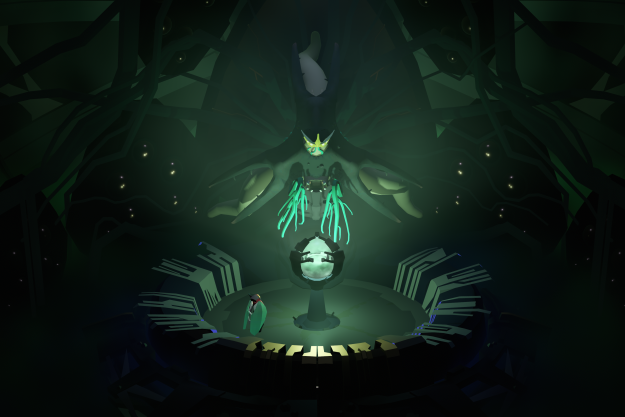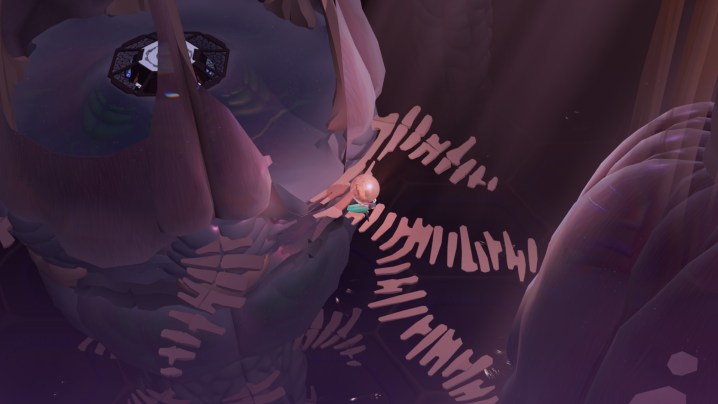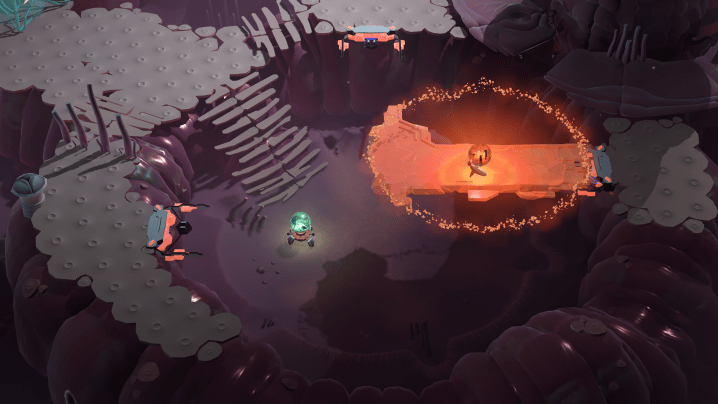
“Cocoon is a mesmerizing debut for Geometric Interactive that's filled with ingenious puzzles that will unlock your animal instincts.”
- Ingenious puzzle design
- Natural gameplay flow
- Excellent use of sound
- Mesmerizing art
- Structural repetition
- Tedious late-game puzzles
I was visiting Pittsburgh last month during the height of the city’s spotted lanternfly crisis. No matter where I walked, I was bound to bump into no fewer than a dozen insects swarming my body. I wouldn’t get a close look at one, though, until one landed next to me as I was eating breakfast one morning. With it sidling up to me fearlessly, I could observe its almost alien structure closely. It had menacingly dark limbs carrying a gorgeous pair of wings that almost hypnotized me, as if it was a defense mechanism built to keep humans from squashing it. I couldn’t stop thinking about how such a tiny, intricate creature was causing a national crisis.
That thought would stick in my mind as I played through Cocoon. The debut surrealist puzzle adventure game from Geometric Interactive (a new studio spun off from Inside developer Playdead) puts me in control of a winged insect navigating an intricate sci-fi world that fuses organic and mechanical design. As I solved puzzles without so much as a word of direction, I began to feel like that spotted lanternfly: a tiny creature capable of navigating a complicated world on instinct alone.
Cocoon is a striking experience that’s unlike anything I’ve played before. It’s an otherworldly celebration of the small creatures on our planet that operate with machinelike efficiency. Elegantly designed, though at times routine, puzzles teleport me into the mind of a bug, an unknowable, instinctive intelligence I yearn to understand.
Animal instinct
When I select New Game from Cocoon’s main menu, I’m suddenly born anew – something that’s made clear with some not-so-subtle imagery. Without a single word or line of explanation, I’m placed in control of a winged creature that’s part man, part beetle. I have no idea where I am, my reason for existing, or even what kind of game I’m about to play. I’m never even given a controller tutorial; I’m an infant crawling out of the womb.

To make it through the world, I need to survive on instinct alone. A premise that puts so much faith in players can be tricky, but Geometric Interactive is the perfect team for the job. That’s thanks in no small part to game director Carlsen Jeppe, who was the lead gameplay designer behind Limbo and Inside. Both of those games featured a similar design philosophy of naturally guiding players through eerie worlds without explicitly telling them what to do. That doesn’t just carry over into Cocoon; it’s the entire heart of the project.
It doesn’t take long for me to find my bearings. When I see a circular pattern on the ground, I walk over to it and press a button on my controller without a second thought. It’s an innate reflex that kicks out of me. That reaction continues when I finally discover the adventure’s core puzzle hook. When finding an orb that I can carry like a dung beetle, I discover that I can jump inside of it and explore a world housed within it. It’s an awe-inspiring technical magic trick as I seamlessly dive between worlds.
I feel like I’m tapping into some inherent intelligence inside of me.
The bulk of Cocoon’s puzzles are built around a sort of efficient juggling act, especially as I find more orbs. To navigate the world, I need to rely on my spatial reasoning skills to carefully place the objects in the environment. Sometimes it’s as simple as placing an orb on a round receptacle to move a hovering platform. Other times, I need to drop orbs within orbs so I can move them all at once. One puzzle has me positioning one inside of another, placing it in front of a turret, and letting the shot travel through them both to open a passage at the right time. Anytime I solve a mind-bending puzzle, I feel like I’m tapping into some inherent intelligence inside of me.
I’d love to take credit for figuring it all out on my own, but a big part of that comes from Geometric’s ingenious design decisions. Its intricate world is mystifying, but not illegible. It’s always clear what I can interact with using the game’s elegantly streamlined one-button control scheme. Most clever is its use of sound to subtly push players in the right direction. The eerie, atmospheric soundscape isn’t just for show; when I’m on the right track to solving a puzzle, the music swells to let me know I’m right before I solve it. It’s an almost invisible detail that fuels its instinctual gameplay loop without totally leaving players to fend for themselves.
Machine-like efficiency
The more I play, the more I become fluent in Cocoon’s mysterious visual language. A surrealist landscape of alien shapes becomes second nature to me. What once was a vague clearing dotted with inscrutable black symbols becomes a simple keypad puzzle I need to solve to unlock a drone. I begin to see patterns baked into both the world and the game design itself, allowing me to operate with the focus of a hive-minded worker ant that always knows where to march.
Cocoon explicitly plays with that dynamic, exploring the intersection between organic life-forms and their at times mechanical efficiency. That idea is even baked into its captivating art direction, as landscapes seamlessly weave together natural insect structures and sci-fi machinery. When I shock a bridge by placing an orb in a round slot, the textured platforms unfurl like a fly’s wings. I feel like a new species born out of a technological singularity.
I slowly morph into an autonomous being running on stimulus-driven instinct.
While it’s a compelling interplay, Cocoon’s structure can at times feel rote. For most of the four-hour game, I’m repeating the same basic gameplay loop. I find an orb, solve a repeated puzzle to get a drone, bring it to a machine that unlocks a vault door, and infuse that orb with a navigational power-up that lets me begin that loop anew. By the third time I repeated that process, I began slipping out of the hypnotizing world as I could feel the “video game” behind it all.
Some of those issues are compounded by some late-game puzzles made tedious by slow game mechanics. More complex challenges require me to slowly walk orbs back and forth between locations or to repeatedly dive in and out of worlds. The fluid pace stalls out in those sequences as it feels like I’m spending more time setting up solutions than actually solving puzzles.

While those moments aren’t always as engrossing as Cocoon’s more mesmerizing sequences, there’s a thematic function to them. The deeper I get into the adventure, the more confident I become. The repetitious beats and movements bring me closer to the mind of an insect with each turn. I slowly morph into an autonomous being running on stimulus-driven instinct. I know exactly where to go and what to do without thinking about it. When I stop and realize how much I’m navigating complex challenges without racking my brain, I flash back to my breakfast with that spotted lanternfly. How was such a small creature thriving in a completely unfamiliar city?
Cocoon brings me one step closer to understanding that mystery. For four hours, I was that tiny creature making the most of my whirlwind existence. I was born into an overwhelmingly alien world and forced to break it down into patterns if I was going to survive. Perhaps my winged friend and I had more in common than I realized. And I hope he felt the same before he was unceremoniously squashed.
Cocoon was reviewed on PC.





